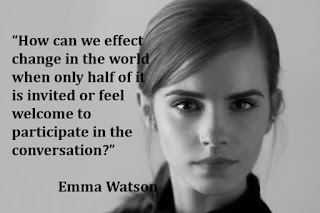Growing up, we are taught that the United States is a land of freedom. A far off land where people can go to pursue the life that they have dreamt of, free of the chains that limit them in their home countries. We hear the term "The American Dream," and we believe that it is possible for anyone to obtain. We see a "melting pot" or a "salad bowl" of different races, cultures, and ethnicities, and from the outside it all looks good. It looks like a diverse land where everyone is mixed up and lives in coexistence with one another, each with the same opportunity for privilege. But is any of this true at all?
Both of the writers that we read, Anzaldua and Moraga, wrote passionately, and strong-mindedly, and even with what seemed like a vengeance, about their personal experiences in difficulty and oppression that they have struggled through as women of color in relation to modern identities. They each spoke of the issues of racial and feminine injustices, as well as how the two combine, and how a different path must be taken to overcome these struggles of divided cultural identities that dominate our world today.
Anzaldua draws a significant amount of attention to a common theme that exists within the feminist movement, this being unity. She emphasizes the need for people to rid their minds of the dualistic cultural perspectives, and instead reconsider with a focus on wholeness. Our country is full of unfair treatment and socioeconomic inequality among the many identities that live within it, but if so many of us recognize this as an issue then why do we still allow it to happen? Just as her title suggests, we must embrace a "new consciousness." One in which we take these divided groups and cultures and learn to become one whole new culture, full of highly awakened spirits, advocates of change, and hopefulness among people to take responsibility in making this an accepted reality.
Looking even closer, it can be seen that these same issues are existent within the borders of the feminist movement. We have differences within our genders, races, cultures, economic statuses, and we let them hold us back. I liked that Moraga used the term, "sisters" in her writing because it serves as a reminder that although different, we are all the same. Why treat another sister as if she is anything less than you simply because of a different appearance, and more importantly, why fight alone when we can stand up and fight together?
Both of the writers that we read, Anzaldua and Moraga, wrote passionately, and strong-mindedly, and even with what seemed like a vengeance, about their personal experiences in difficulty and oppression that they have struggled through as women of color in relation to modern identities. They each spoke of the issues of racial and feminine injustices, as well as how the two combine, and how a different path must be taken to overcome these struggles of divided cultural identities that dominate our world today.
Anzaldua draws a significant amount of attention to a common theme that exists within the feminist movement, this being unity. She emphasizes the need for people to rid their minds of the dualistic cultural perspectives, and instead reconsider with a focus on wholeness. Our country is full of unfair treatment and socioeconomic inequality among the many identities that live within it, but if so many of us recognize this as an issue then why do we still allow it to happen? Just as her title suggests, we must embrace a "new consciousness." One in which we take these divided groups and cultures and learn to become one whole new culture, full of highly awakened spirits, advocates of change, and hopefulness among people to take responsibility in making this an accepted reality.
Looking even closer, it can be seen that these same issues are existent within the borders of the feminist movement. We have differences within our genders, races, cultures, economic statuses, and we let them hold us back. I liked that Moraga used the term, "sisters" in her writing because it serves as a reminder that although different, we are all the same. Why treat another sister as if she is anything less than you simply because of a different appearance, and more importantly, why fight alone when we can stand up and fight together?



ReplyDeleteI agree that America is seen as an ideal melted society. My question is should we change this image of America or should we change America itself? I think it should be a little bit of both. White people also need to accountable for their past crimes and not try to "americanize" people of color out of their cultures. Also, I really loved your last question because it is so true- why should we fight alone when together we would be so strong? There is so much we, as women, could accomplish if we finally put differences aside. This is not to say that we can erase a past of hatred and prejudice but we can move forward to a better future.